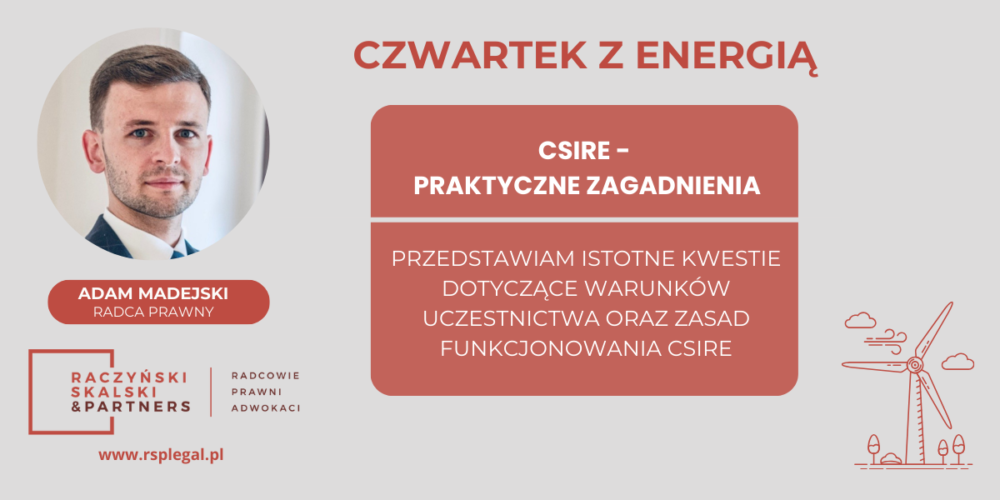The Central Energy Market Information System is a major project aimed at increasing the efficiency and modernising the operation of the electricity system. First and foremost, in contrast to the current model, all metering, billing and technical data on electricity flows (generation, sales, transmission and off-take) are to be collected, analysed, transferred and processed within a single entity – the Energy Market Information Operator (OIRE), the function of which was entrusted to the company Polskie Sieci Elektroenergetyczne S.A.
In the briefest summary, the sense of the CSIRE is illustrated by the following graphic, taken from the website of the Energy Regulatory Office


1. Obligation for energy market participants to enter into a contract
In order for the purpose of CSIRE to be achieved, it is necessary for each energy market participant responsible for the circulation of electricity in the system to register with the system. This is done by concluding an agreement with the CSIRE (Article 11zg(1) of the Energy Law).
The model agreement is in the form of a template annexed to the Transmission Network Operation and Maintenance Manual, in the OIRE section. It is a specially separated part of the TNC that comprehensively regulates the principles of operation and use of the CSIRE from a system point of view.
A model contract is available at https://www.pse.pl/dokumentysafeargs=666f6c64657249643d34303630323837343935.
The obligation to conclude a contract covers:
-
-
- electricity distribution system operators,
- electricity retailers,
- entities responsible for balancing,
- other entities performing energy market processes or exchanging energy market information via the central energy market information system, e.g. aggregators, network owners or entities operating in the power market
-
The agreement must be concluded by 3 April 2024 (Article 21 of the Act of 20 May 2021 amending the Energy Law and certain other acts). This deadline is due to the need to carry out a number of tests and synchronisations aimed at guaranteeing the full functionality of CSIRE from the moment of launch. Entities that are obliged under the Energy Law to conclude an agreement with OIRE, but will start their operations after 3 April 2024, should conclude an agreement with OIRE immediately, before the start of operations.
Contractual obligation vs. access to CSIRE data
In the context of CSIRE’s activities, two issues must be distinguished – the obligation to join the system and the possibility of obtaining data from it. Indeed, the first issue relates to the guarantee that each entity that processes electricity data in the electricity system will provide complete and correct data necessary for the implementation of the so-called energy market processes, which are understood as ‘a sequence of activities carried out by at least two entities that are an electricity system user or an energy market information operator, on the basis of which the sale of electricity, its introduction to the grid or its off-take or the provision of electricity-related services takes place’ (Article 3(7a) of the Energy Law).
The above implies that the aim of the CSIRE is to concentrate all data on energy market processes within a single entity. Currently, these processes are dispersed, primarily between electricity system operators. This not only results in longer processing and collection of data, but also in the need for significant resources to be committed to handling these processes by the entities involved. CSIRE is designed to offset these inconveniences and, through the full electronicisation of activities, significantly speed up the execution of individual activities in the system.
In turn, access to the data collected in the CSIRE will be available not only to entities obliged to conclude an agreement with the IOE, but also, and perhaps primarily, to ‘ordinary’ users of the electricity system, primarily end users (Article 11zc(1) of the Energy Law). Providing such access (limited to data relating to a specific user) is intended to allow more informed decision-making regarding, for example, the energy seller or participation in certain instruments supporting the energy market (e.g. aggregation). Furthermore, CSIRE is also expected to significantly support the functioning of instruments such as:
-
-
- offer comparison engine (Article 31g of the Energy Law),
- concluding an agreement for the sale of electricity with a dynamic price (Article 5(4g) of the Energy Law),
- change of electricity seller in 24 hours (Article 4j(6a) of the Energy Law),
- aggregation (Article 5a(1) of the Energy Law),
- flexibility services (Article 3(11k) of the Energy Law).
-
3. Other relevant issues concerning CSIRE
In order to ensure that access to the data collected in CSIRE for individuals is not hindered (e.g. does not involve the obligation of prior registration or authentication), the legislator obliged OIRE to enable the use of the system using a trusted profile (Article 11zb, paragraph 4b of the Energy Law). Such an option, however, requires the relevant CSIRE user (e.g. the seller) to have data identifying the customer.
The issue of personal data is particularly important in the context of CSIRE, as the whole – as a system – will constitute a complete database of information on all participants in the electricity system. For this reason, entities processing, other than their own, data contained in the CSIRE are obliged to ensure protection against actions that threaten the confidentiality, integrity, availability and authenticity of the processed data (Article 11zd(1) of the Energy Law). The individual metering data will be stored in the system for 7 years and will then be anonymised (Article 11zf(1) and (2) of the Energy Law). Such an action will allow the data to be used for analytical or statistical purposes.
The entry into force of the CSIRE has been coupled systemically with a significant change in the provisions on reserve sales. The current model, in which there are multiple entities in the market that can provide reserve sales services, will be replaced by a more integrated solution in which the reserve seller will be the so-called obliged seller, whose status is regulated in Article 40 of the Renewable Energy Sources Act. Thanks to the CSIRE functionalities, it will be possible to make a smooth transition from sales based on commercial conditions to reserve sales when the conditions for doing so are met. You can read more about the new reserve sale model in another post:
https://rsplegal.pl/czwartek-z-energia-sprzedaz-rezerwowa-praktyczne-podsumowanie/



